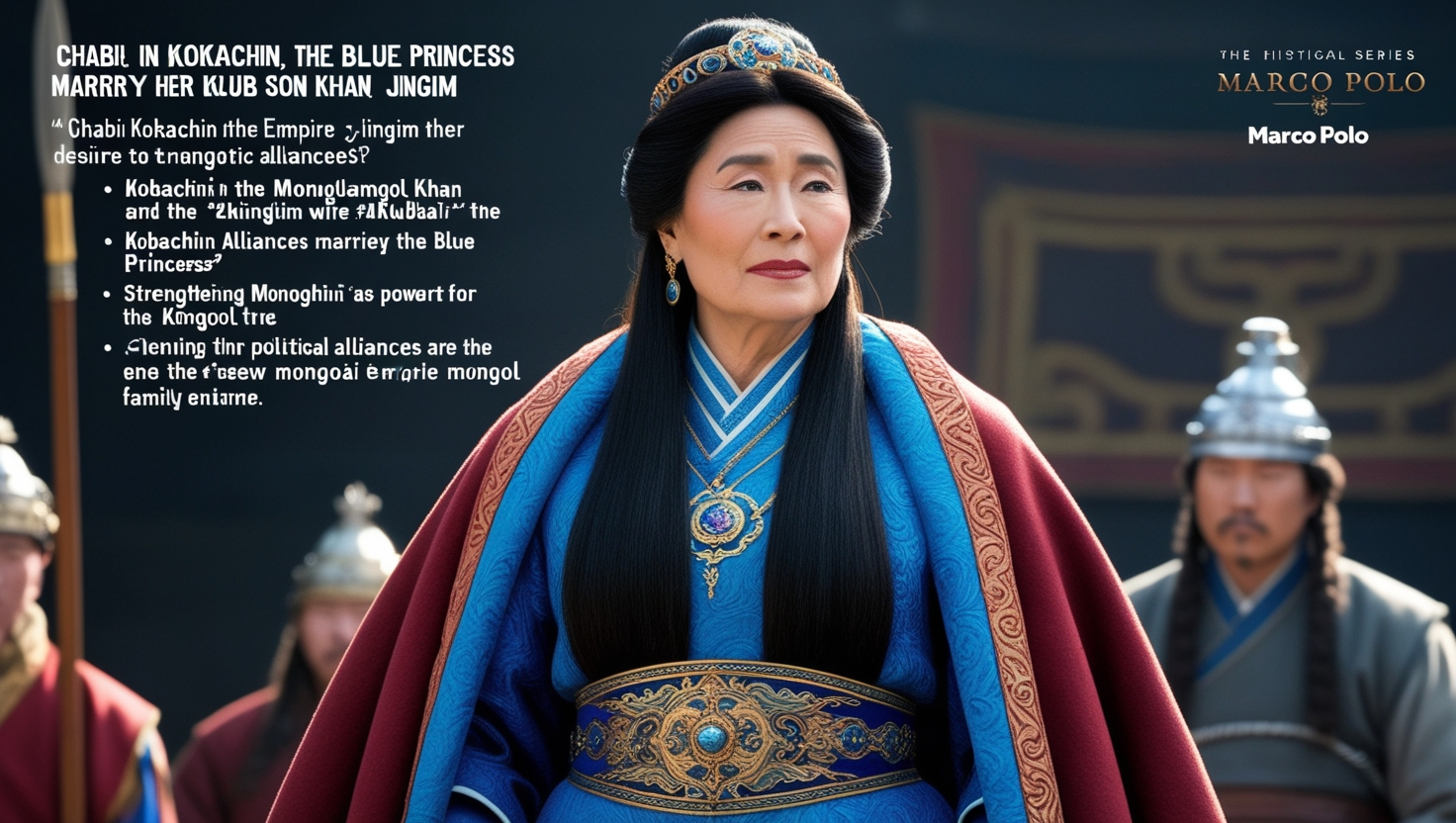Introduction
In the historical drama series “Marco Polo,” Chabi, the influential wife of Kublai Khan, plays a pivotal role in shaping the political landscape of the Mongol Empire. Her desire for Kokachin, the Blue Princess, to marry her son Jingim is a strategic decision driven by multiple motivations. “Why Does Chabi Want Kokachin to Marry Her Son” This article delves into the key reasons behind Chabi’s insistence on this union, highlighting the political, cultural, and dynastic implications of such a marriage.
Strengthening Political Alliances
One of the primary reasons why Chabi wants Kokachin to marry her son is to strengthen political alliances. Kokachin, depicted as a member of the Mongolian aristocracy, represents a significant alliance for Kublai Khan’s family. By bringing Kokachin into their family, Chabi aims to solidify the loyalty of Kokachin’s tribe, ensuring their support for the Khan’s rule. In the context of the Mongol Empire, marriages were often used as diplomatic tools to unite different factions and prevent internal conflicts. This alliance would provide a robust support base for the ruling family, crucial for maintaining power and stability.
Legitimizing Jingim’s Position
Jingim, as Kublai Khan’s son and heir apparent, needs to establish his legitimacy and strengthen his claim to the throne. Marrying Kokachin, who holds significant status and respect among the Mongols, would enhance Jingim’s position as the future Khan. Chabi understands the importance of consolidating her son’s claim to leadership through a marriage that boosts his prestige and political base. This union would not only provide Jingim with a powerful ally but also ensure that his leadership was accepted and respected by the Mongol tribes.
Ensuring Cultural and Political Stability
Chabi’s desire for Kokachin to marry her son also stems from a need to ensure cultural and political stability within the Mongol Empire. By arranging this marriage, she aims to create a sense of unity and cohesion among the different Mongol tribes. This unity is crucial for maintaining control over the vast territories of the empire and for preventing potential rebellions or power struggles. A stable and united front would allow Kublai Khan to focus on external threats and expansions rather than internal discord.
Expanding Influence and Control
As the wife of Kublai Khan and mother of Jingim, Chabi wields considerable influence within the court. Orchestrating the marriage of her son to Kokachin would extend her influence and ensure that key allies remain loyal to her family. This strategic move helps her maintain control over court politics and the future direction of the empire. By positioning herself as a key player in arranging important alliances, Chabi secures her power and the power of her family within the Mongol hierarchy.
Securing the Future of the Dynasty
Chabi is deeply concerned with the long-term stability and success of the Yuan dynasty. Ensuring that her son marries a respected and influential princess like Kokachin is part of her broader strategy to secure the future of the dynasty. This marriage would produce heirs with strong claims to leadership, thereby safeguarding the legacy of Kublai Khan and the continuity of their rule. The union would not only strengthen the immediate political landscape but also ensure a stable succession plan for future generations.
Enhancing Dynastic Prestige
The marriage between Jingim and Kokachin would enhance the prestige of the Yuan dynasty. Kokachin’s noble lineage and respected status among the Mongols would bring additional honor and recognition to the ruling family. This increased prestige would solidify Kublai Khan’s authority and elevate the dynasty’s status among other ruling families and tribes within the empire.
Mitigating Potential Threats
By marrying Kokachin to her son, Chabi also aims to mitigate potential threats to their rule. Bringing influential figures like Kokachin into the family fold reduces the likelihood of them becoming adversaries. Instead of posing a threat from the outside, these figures became part of the ruling structure, loyal to the family and invested in its continued success.
Facilitating Diplomatic Relations
The marriage of Jingim and Kokachin serves as a diplomatic gesture, strengthening relations between the Mongol Empire and other regions. Such marriages were often used to forge ties and create lasting bonds between different territories. By aligning with Kokachin’s tribe, Chabi aims to foster better diplomatic relations and ensure peace and cooperation across the empire.
Addressing Internal Challenges
Within the complex political landscape of the Mongol Empire, addressing internal challenges is crucial. By arranging the marriage, Chabi aims to address potential internal conflicts and create a harmonious environment within the royal family. This strategic alliance helps manage internal dissent and ensures that all factions within the empire remain supportive of Kublai Khan’s rule.
Upholding Traditional Practices
Chabi’s decision to marry Kokachin to her son also upholds traditional Mongol practices of using marriages to strengthen alliances. This adherence to tradition ensures that the ruling family remains respected and the wider Mongol community accepts their decisions. It demonstrates their commitment to cultural norms and practices, reinforcing their legitimacy as leaders.
Promoting Unity Among Mongol Tribes
The union between Jingim and Kokachin promotes unity among the various Mongol tribes. By bringing different tribes together through marriage, Chabi aims to create a more cohesive and unified Mongol identity. This unity is essential for maintaining the strength and stability of the empire, enabling it to withstand external pressures and thrive.
Demonstrating Leadership and Vision
Chabi’s strategic marriage arrangement demonstrates her leadership and vision for the future of the empire. Her ability to navigate complex political landscapes and make decisions that benefit the dynasty highlights her importance as a leader. This foresight ensures that the ruling family remains strong and capable of leading the empire effectively.
Balancing Power Dynamics
In a court filled with various factions and power dynamics, balancing these forces is crucial. By arranging the marriage, Chabi seeks to balance power within the court, ensuring that no single faction becomes too powerful. This balance helps in maintaining a stable and functional governance structure within the empire.
Ensuring a Loyal and Supportive Court
A loyal and supportive court is essential for effective governance. By integrating Kokachin’s tribe into the royal family, Chabi ensures that the court remains loyal and supportive of Kublai Khan’s rule. This loyalty is vital for implementing policies and maintaining control over the vast territories of the empire.
Conclusion: Strategic Marriage for a Stronger Empire
In summary, the question “Why does Chabi want Kokachin to marry her son?” can be answered through various strategic motivations. Chabi’s desire for this marriage is driven by the need to strengthen political alliances, legitimize Jingim’s position, ensure cultural and political stability, expand influence and control, secure the future of the dynasty, and enhance dynastic prestige. This union is a testament to Chabi’s strategic insight and her dedication to maintaining the strength and stability of the Mongol Empire. Through this marriage, she aims to create a more cohesive, loyal, and robust ruling structure capable of leading the empire to continued success.







